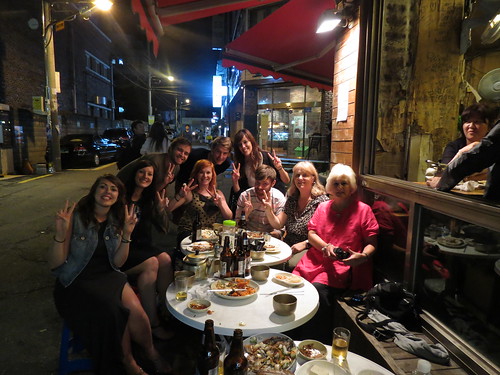As sometimes happens in life, this weekend (and over the course of the last couple of weeks, in fact) I found myself thinking on some things, and then, this afternoon, a link popped up on one of my social networking accounts to
this article from
Groove, which runs a weird parallel to some of the things B and I have been dealing with lately.
Only a parallel, though, and not the exact same line.
A long while back, when B and I were first discussing moving in together, we had a conversation while out for a walk on a winter day, about all the various things we were scared of, when it came to moving in together. I've often thought that it's lucky that B and I are usually on the same page with commitment type things, because otherwise, there'd be a lot more hurt feelings. I think the adjustment to coming around to living together has been made a lot easier by the fact that we both feel we can be completely honest about our doubts and hesitations, without worrying about the other party taking it personally. We both get it -- it's a big step, one that neither of us has felt inclined to ever take before, and it's going to mean a lot of good, new things, but it is also going to mean letting go of a few things in the process.
Anyway, back to the walk -- I confided that one of my biggest fears was that I would end up taking on the brunt of the household duties. That I was worried about the time demand of grocery shopping, cooking and cleaning for two. Or at the very least, probably, one and a half. B vehemently denied the possibility that anything like that would happen -- he had been living on his own and taking care of himself for several years. He was adjusted to not relying on his mother to do everything for him. I warned him at the time that I knew how these things worked, that it wasn't so easy for a man who had been raised in a certain kind of environment, no matter how adjusted he was to taking care of himself, not to revert back to old ways once there was a woman in the house again.
What I hadn't realized at the time is something that has only just fully dawned on me in the past few weeks, which is that I, too, have my own cultural baggage with regards to a woman's place in the home.
Unlike the author of the
Groove article, I was raised in a home that ran very similarly to the way a more traditional Korean home is run. It's not a cultural difference that B and I have to surmount, but rather a cultural similarity we're both going to have to work together to overcome.
The 'epiphany' moment for me, with this, came a few weekends back, while in the midst of packing, off loading more stuff, finishing up the ordering, installing and assembly of the new apartment's dressings, arranging for a mover, and just after the stress of having orchestrated two out-of-town trips, largely in a foreign language. Work stress. Stress from the new journal. The mounting stress of applying to, paying for and planning around school. My plate has been very full for going nigh on a year, now.
I had already been on B's case for a couple of weeks, especially in regards to the furniture for the new place and our trip down south. B has a bad habit, which he readily admits, of somehow figuring that because I'm pushing him to help me get something done, that I'm absolutely gungho about doing it myself. Not so. I just see that certain things need to be done and, despite not really looking forward to doing them, myself, I don't see the point in putting them off. Then starts the nagging. And in the process, I have to remind him what seems to me to be approximately a million times, that I don't want to be doing this either. But it has to be done.
It drives me nuts. It drives him nuts, too. But naturally, I feel I am in the right.
There's an added level to this ordinary couple-style bickering, as well, which comes down to the fact that doing anything in Korean, or on Korean websites, for me is a lot harder than it is for him. And there had been some built-up tension over that, as well. Some of it self-hating, on my part. I hate that certain things we both should be helping with are easier for him, and I hate that I haven't gotten to the point where they are as easy for me. I hate feeling resentment for it when, not only am I trying to book our trains and hotels alone, I'm also doing it in a language that he speaks natively and I speak haphazardly.
In some ways, it's good for me, because I do worry at times that having B on hand has hampered my progression in the realm of independence in this country. I don't want to get too comfortable with asking him to do things for me, rather than figuring out how to take care of them myself. Even if there are language issues, and even if it is an entire system that is new to me and different from the way things are done in my home country. I think it's obvious enough at this point that self-pride is a big part of the issue, on both sides.
But the fact is, I also don't want to allow him to settle into complacency and the idea that if he doesn't want to do something, and he can come up with enough ways to make it difficult for me to get him to help, he can get out of doing them. I don't want a partnership like that. It makes me unhappy, bottom line. And if something is making you unhappy, you have an obligation to the relationship to speak up about it.
So, we'd been dealing with all of this. And on one bright, sunny Saturday morning, when I had been sitting out at the kitchen table trying to get one or another task accomplished for a couple of hours already, he came sauntering out of the bedroom having just woken up and said, simply, "I'm hungry."
And I more or less lost it. And by "lost it", I mean, I turned completely cold and quiet. Which is what tends to happen when something has made me completely furious, and I have no idea why. So B sat there reading the mood and trying not to make any sudden moves, as I tried to frantically replay the entire situation in my head again and again and figure out why I was suddenly so angry.
What it came down to, after a little gathering of my thoughts and emotions on my part, and after a little while of talking it over together, was that it didn't ultimately matter what the intention behind the "I'm hungry" announcement was. It didn't matter if he was just informing me of a fact, or, as I strongly suspected, letting me know that he had an expectation for me to meet, because the end result was the same -- I felt responsible.
This is going to be hard for feminists who were raised in a different kind of household to understand, perhaps. I think for some women it's difficult to grasp how certain ultimately sexist ideas are built into not only your family structure, but also your idea of loving and caring for other people.
My female role models growing up were three strong women who would stop at nothing to protect and care for their families. They didn't take nothing from nobody, in a lot of ways, but they also had a lot of pride in what it meant to be the woman of the house. And, in my mind, rightly so. It's difficult for me to articulate, but to them, taking their humble resources and creating a clean, comfortable home and a satisfying meal was no less warrior-like than being willing to defend your family with your fists. They fought hard against their circumstances to do the best for their families, in the same way that the men did, in their own ways -- all three eventually, in fact, stepping into the men's shoes themselves, and handling both roles at once. But not one of them ever abandoning their notion of what their primary role was.
But, here's the thing. In my home, although the woman's station might ultimately be placed below the man's (and it often was), the role of homemaking was never placed below that of providing, monetarily. Although I was taught all kinds of garbage about being submissive, and the man being the head of the household, I never once in my life remember a single member of the family, male or female, speaking disparagingly of the traditional female responsibilities. Homemaking was something to be proud of, and it was considered to be hard work worthy of praise and gratitude. The problem was the overwhelming emphasis on who was to be responsible for all of that hard work.
So I have a new, weird and conflicting inner battle to wage, as I move closer and closer to being the woman of a house. I can't help it -- it's in my bones. I feel proud of taking care of my home. I feel proud of preparing food to nourish the people around me. When my mother took a part time job, and started taking night courses at the local college when I was in the second grade, I was given a kind of talk that many men may relate to, something along the lines of that speech you've seen so often in movies, about how 'you're the man of the house, now,' only mine involved laundry, dishes and preparing food. And I realize how that may sound, but all I can tell you is that it felt differently than you might think. It felt like a promotion, like an entrusted and important role, just as much as it felt like an unfair burden when there was still a perfectly capable adult man at home in the evenings (my father).
When B says, "I'm hungry," I hear a lot of things. I hear, "I expect you to do the thing that women are supposed to do, regardless of the fact that I'm perfectly capable of doing it myself." I also hear, "I'm in need. Take care of me." And at the moment, I'm in the process of figuring out what those conflicting messages mean for me, personally.
In the meantime, after our talk, B has agreed to understand that I have a job. That I have career aspirations that are in full swing. That I am, ultimately, another fellow adult with a lot of responsibilities and my own shit to worry about. That, as much as I would love to follow his original suggestion to 'just tell [him] no', it's not that simple for me. That just the words hanging in the air make me feel a long lineage of filial and feminine obligation. That my intellectual ideas and the things that are ingrained into my psyche don't always match up so cleanly. And that sometimes, when he feels hungry, he might also consider that maybe I'm hungry, too. And fucking cook something. For both of us.
I'm No Picasso
This is a tale of the seaports where chance brings the traveler: he clambers a hillside and such things come to pass. | In Imminent Danger
Bits and pieces about Korean literature and translation philosophy |

























































































